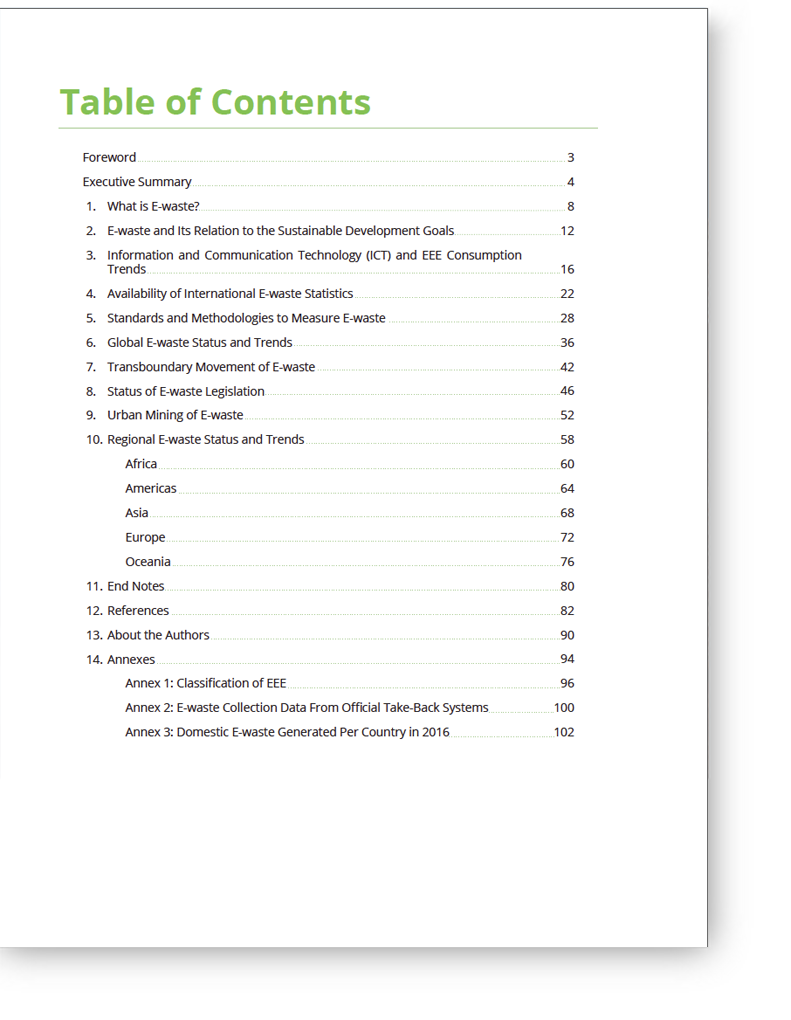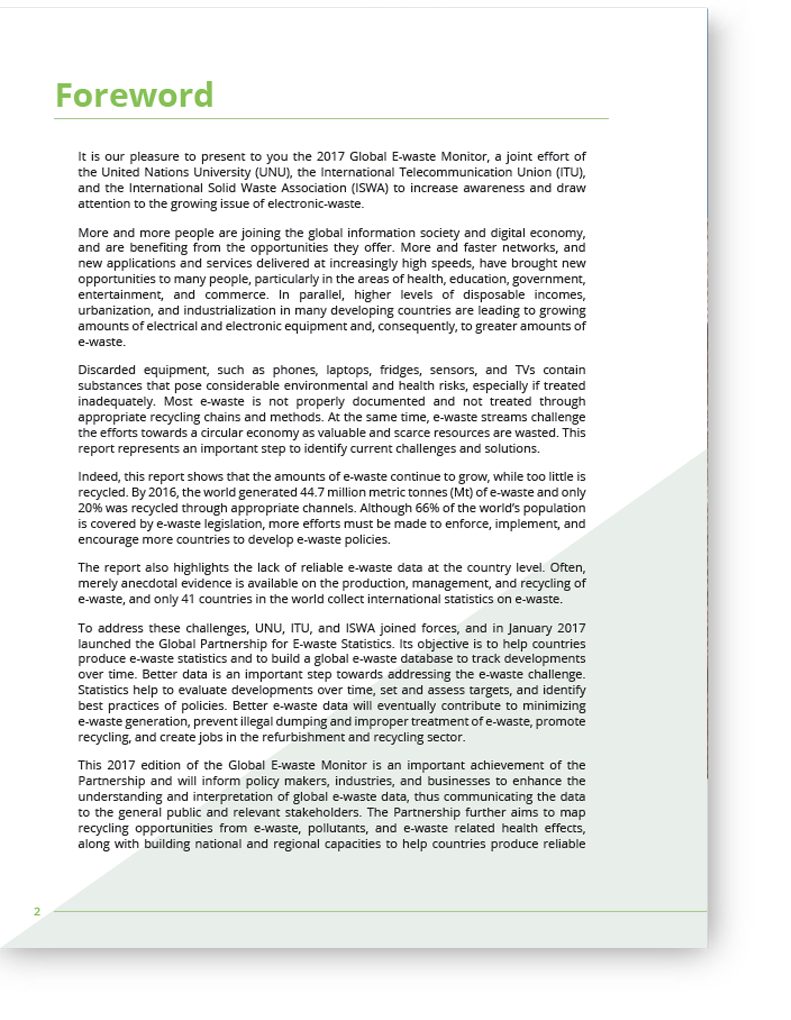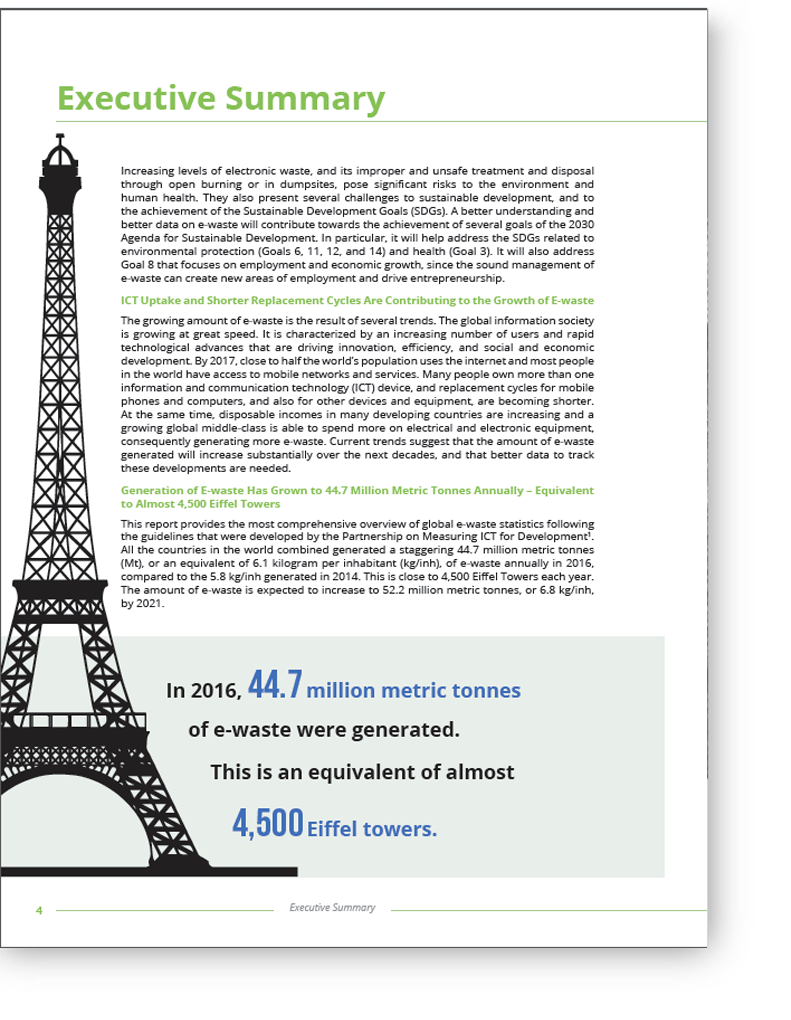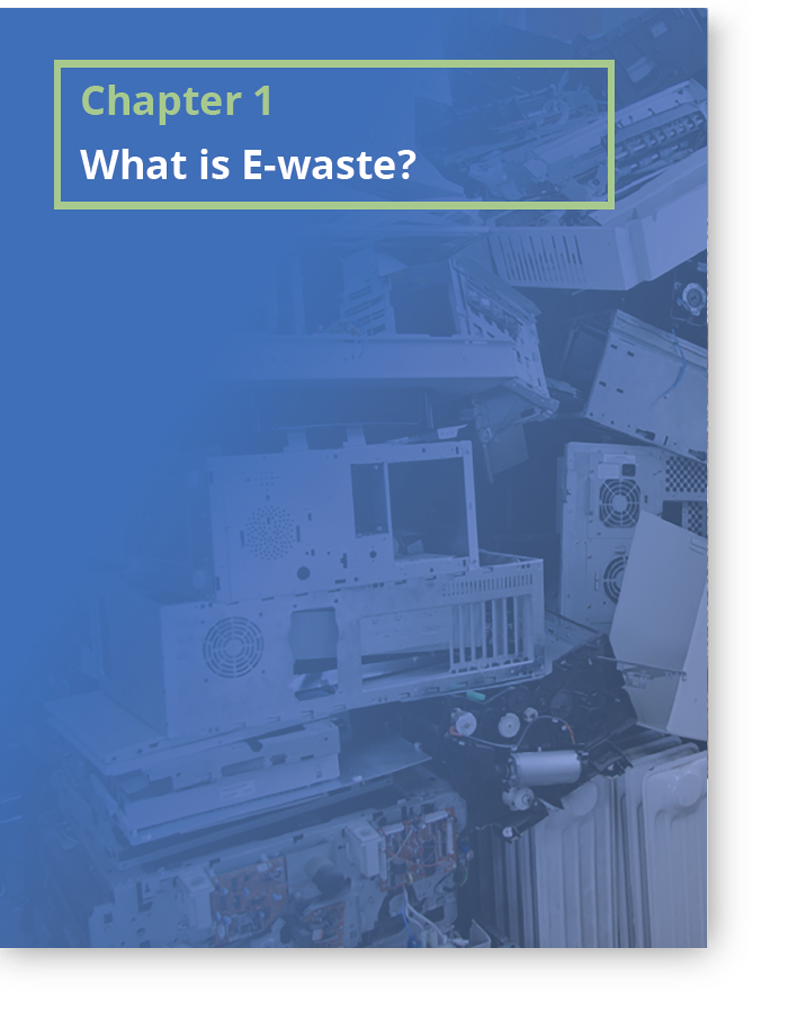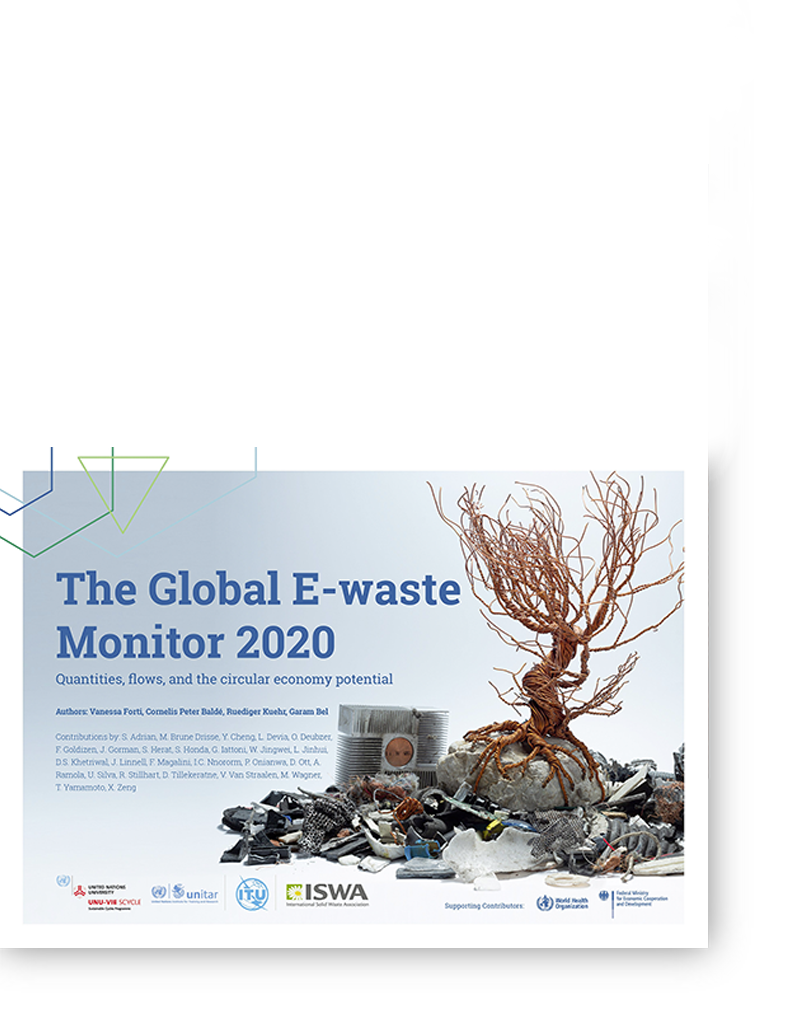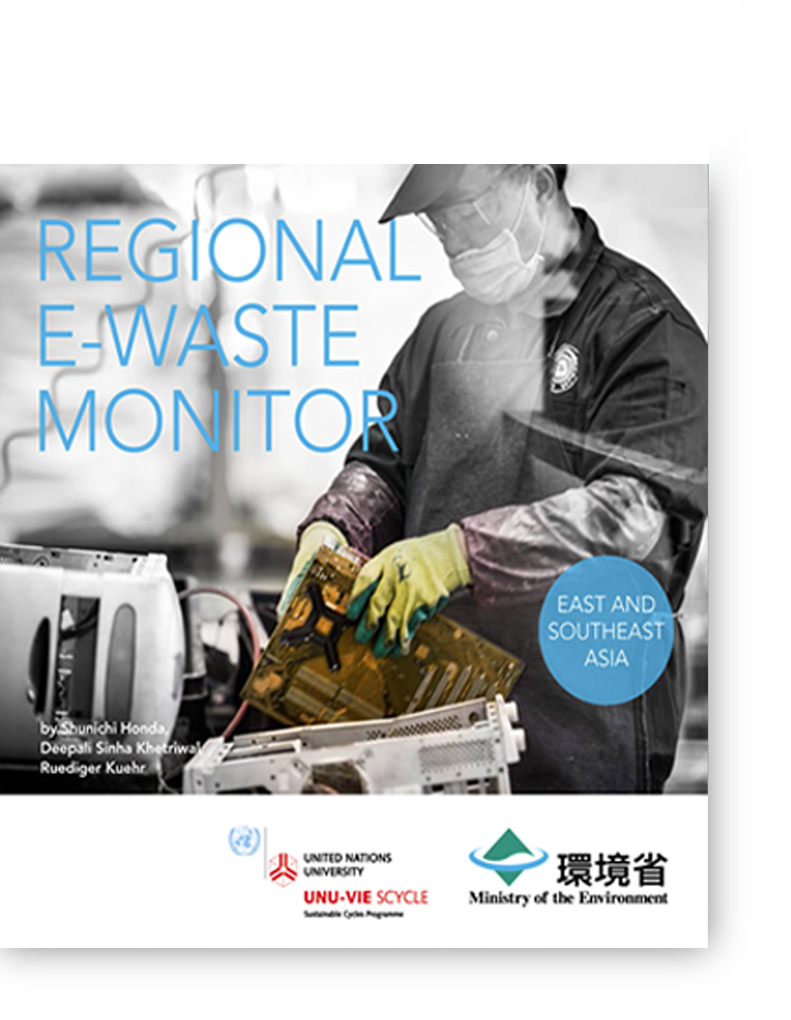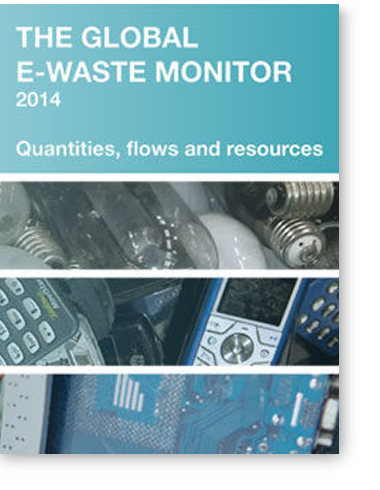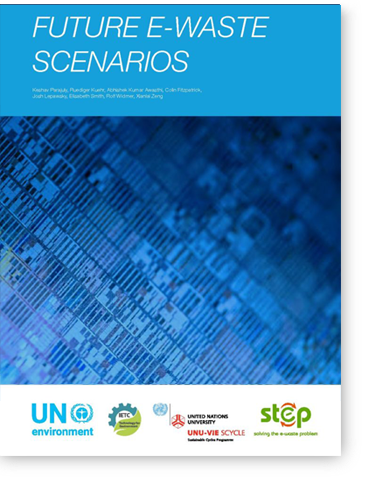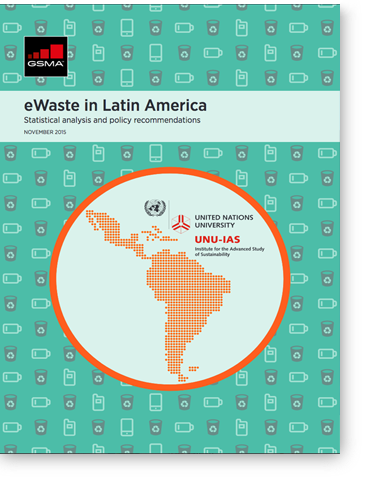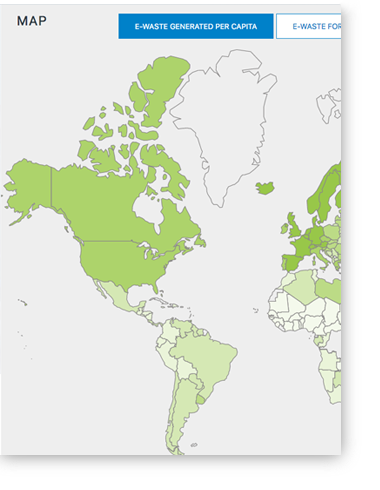The Global E-waste Monitor 2017 – Quantities, Flows, and Resources
The Global E-waste Monitor 2017 is a collaborative effort of the United Nations University (UNU) represented through its Vice-Rectorate in Europe hosted Sustainable Cycles (SCYCLE) Programme, the International Telecommunication Union (ITU), and the International Solid Waste Association (ISWA).
This report provides the most comprehensive overview of global e-waste statistics and an unprecedented level of detail, including an overview of the magnitude of the e-waste problem in different regions. The report includes up-to-date information on the amounts of e-waste generated and recycled, makes predictions until 2021, and provides information on the progress made in terms of e-waste legislation. The e-waste volumes are indicative of the recycling industry’s potential to recover secondary resources, as well as setting environmental targets for detoxification.
The report highlights the need for better e-waste data and information for policymakers to track progress, identify the need for action, and to achieve sustainable development, including the Sustainable Development Goals (SDGs).
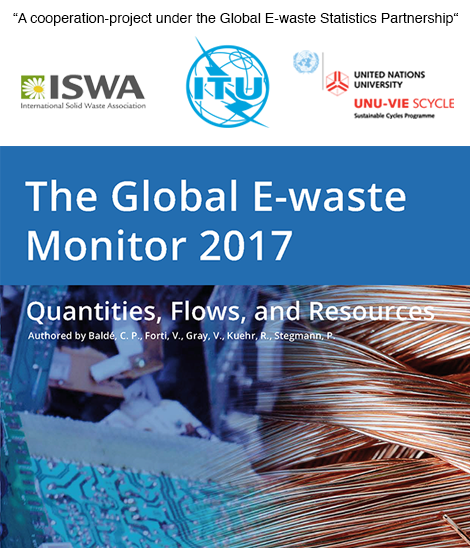
Book Preview
About the authors

Dr. Cornelis Peter Baldé (Kees)
Dr. Cornelis Peter BALDÉ (Kees) is a Senior Programme Officer at the Sustainable Cycles Programme at the United Nations University. At the UNU, Kees’s main tasks are to lead the statistical work, build institutional capacity on waste statistics in various countries, and waste policies, provide policy advice on e-waste to countries, and supervise staff and the strategic development of the team. He is one of the founders of the Global E-waste Statistics Partnership. Kees is currently the co-chair of the Taskforce on Waste Statistics of the UNECE Conference of European Statisticians that is tasked with developing a framework for waste statistics that is sufficient for monitoring current and future circular economy policies as well as waste policies. Additionally, Kees has been selected by the Dutch government as a member of the board of directors of the Dutch Waste Electronical and Electronic Appliances Register, a role he has held since 2015. In 2018, the Global E-waste Monitor 2017 won the European Advanced SDG award from the Diplomatic Academy in Vienna. At Statistics Netherlands, Kees received the Innovation Award for the Dutch Green Growth publication in 2012. Previously, Kees worked at Statistics Netherlands as the deputy head of the Environment Statistics team. He earned his PhD on hydrogen storage at the Faculty of Chemistry at Utrecht University.

Vanessa Forti
Vanessa FORTI is a Programme Associate at UNU-Vie-SCYCLE. Vanessa's research is focused on waste quantification and the evaluation of its impacts, and she is the author of various publications that focus on quantifying e-waste amounts and environmental impacts, such as the 2017 edition of the Global E-waste Monitor 2017 (Baldé et al. 2017) and the globally recognised E-waste Statistics Guidelines on classification, reporting and indicators (Forti et al. 2018). The Global E-waste Monitor 2017 won the European Advanced SDG award from the Diplomatic Academy in Vienna. She is responsible for the regular update of methodologies, programming, data collection, surveying, modelling, and reporting on waste statistics (e-waste, mercury, and battery waste), and she attained the role of Data Manager within the SCYCLE team. In addition, she has co-developed EEE Placed on Market and WEEE Generated tools and manuals that are used globally. She is also a member of the Global E-waste Statistics Partnership, which works to help countries produce e-waste statistics and to build a global e-waste database for tracking developments over time. She is in charge of organizing, developing, and conducting capacity-building workshops on e-waste statistics and building institutional capacity on e-waste in developing countries. Vanessa holds a Master's degree in Environmental Engineering from Università degli Studi di Bologna, where she graduated cum laude.
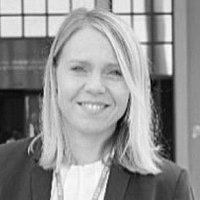
Vanessa Gray
Vanessa GRAY is the Head of the Division for Least Developed Countries (LDCs), Small Island Developing States (SIDS) and Emergency Telecommunications within the International Telecommunication Union’s (ITU) Telecommunication Development Bureau (BDT). In this position, she is responsible for studying the ICT needs of LDCs, Landlocked Developing Countries (LLDCs) and SIDS, developing specific programs of assistance tailored to address the particular vulnerabilities of these countries, and identifying ICT for development opportunities. Vanessa coordinates the BDT’s work in the area of emergency telecommunications, to develop ICT projects and provide assistance for disaster prevention, preparedness, mitigation, response, and recovery. She is also responsible for the BDT’s work on e-waste and climate change adaptation. Vanessa holds a Master’s degree in Political Science and Economics from the Graduate Institute of International and Development Studies in Geneva (Switzerland).
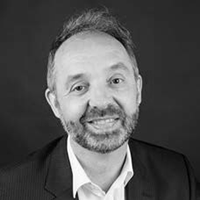
Dr. Ruediger Kuehr
Dr. Ruediger KUEHR is Director of the UNU Vice Rectorate in Europe, Sustainable Cycles Programme (SCYCLE), focusing its work and activities on sustainable production, consumption, and disposal. Ruediger co-founded the Solving the E-waste Problem (StEP) Initiative and functioned as its Executive Secretary from 2007-2017. From 1999-2009, he served as Head of the UNU Zero Emissions Forum (ZEF) – European Focal Point, and from 2000-2002 he was Secretary to the Alliance for Global Eco-Structuring (AGES) under UNEP’s Cleaner Production Network. Ruediger has co-authored and co-edited several books, studies, and proceedings, including the previous Global E-waste Monitors in 2014 and 2017. He also publishes and lectures on, inter alia, environmental technology transfer, transnational environmental policies, strategic sustainable development, and development cooperation. Ruediger has also been the Project Manager of the “2008 Review of Directive 2002/96/EC on waste electrical and electronic equipment (WEEE)” (2007). A political and social scientist by education with a PhD (Dr. rer. pol.) from the University of Osnabrück (Germany) and an MA from the University of Münster (Germany), as well as additional post-graduate studies in Tokyo, (Japan), he has served as Senior R&D Specialist with The Natural Step in Sweden and as a freelance policy-consultant to various national governments.

Paul Stegmann
Paul STEGMANN was previously a project coordinator for the technical cooperation department at the International Solid Waste Association (ISWA). He is currently a PhD-Candidate at Utrecht University, working on projects in the fields of circular economy & waste management, bio-based economy and development cooperation.
